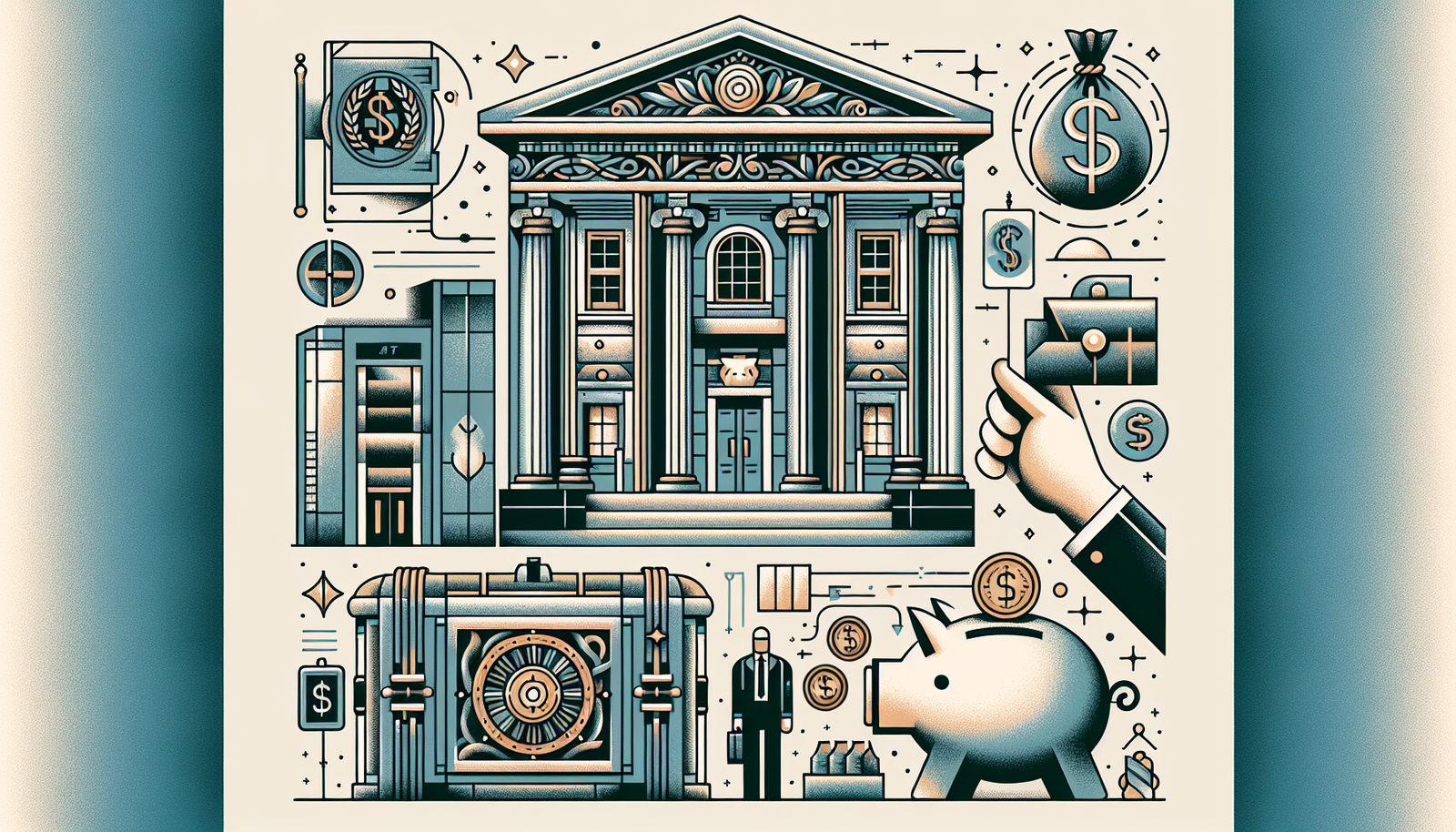
Imagine a world bustling with financial transactions, where money shifts hands with a relentless rhythm, seemingly as constant as a heartbeat. This is the pulsating world of banks, functioning as the financial arteries that pump money across the global economy. “How Do Banks Work?” unveils the mystery wrapped around the banking system. Right from your first checking account, to that pint-sized credit card, this article breaks down the intricacies of these powerful institutions, translating the complex language of finance into simple, digestible statements. You’re about to embark on a journey that will equip you with the knowledge to navigate the banking maze with finesse, painting a clearer picture of how your money, your investments and more importantly, your financial future, is managed.

Basic Functioning of Banks
In the vast world of economics, banks play the role of a beating heart, pumping financial life into societies. They serve as the primary hub where money flows in and out, systematically distributed to areas where it’s needed most.
Understanding the role of banks in an economy
Picture the economy as an enormous engine, and banks as a key component that keeps it running smoothly. Banks facilitate transactions, enable investments, and provide the necessary financial stability for continuous economic growth. They help you not just store your value securely, but also grow it and use it more effectively and efficiently.
Services typically provided by banks
Do you have money to stash away? Banks can serve as your safety vault. Need to pay your bills? Your bank can provide payment services. Looking to grow your funds? Banks can invest your money. They function as all-in-one financial service providers, offering a vast array of services, including checking and savings accounts, loans, mortgages, investment services, and business financing.
Different types of banks
Banks, like your favorite coffee, come in a variety of forms. There are commercial banks focused on business lending, retail banks catering to individual customers, and investment banks specializing in securities and other investment services. Then you have cooperative banks owned by their customers and online banks that offer their services exclusively on the internet. Each cater to different needs, allowing you to choose what suits your financial taste best.
Deposits and Savings Accounts
Banks and deposits go way back, it’s a centuries-old love story. Deposits form the lifeblood of banks, enabling them to perform their various functions.
Importance of deposits to banks
Think of deposits as the seeds that enable a bank to grow its financial tree. Banks use deposits to lend money to borrowers, generating a profit from the interest charged. The more deposits a bank has, the more capital they have to lend, thus the greater their earning potential.
Interest benefits on savings accounts
Look at interest on savings accounts as a sweet reward you receive for entrusting your money to the bank. It’s a percentage of your deposit that the bank pays you for the privilege of using your money. This incentive not only makes your money grow over time, but it also encourages more deposits.
How banks safeguard deposits
Your deposits are not just stashed away in a giant vault. Banks employ a combination of federal insurance, prudent reserve practices, and robust security measures to safeguard your money. This way, even if the bank faces financial distress, your deposits remain secure.
Lending and Mortgages
At the core of a bank’s operations is the process of lending. Banks are like financial gardeners, sowing loans and reaping interest in return.
Process of lending by banks
When you borrow from a bank, it’s not just handing you a sack of cash. Banks evaluate your creditworthiness, set the terms of the loan, and schedule the repayment plan. The interest charged on the borrowed amount is their key source of revenue.
Understanding risks and rewards in lending
Lending is a high-stakes game for banks. Every loan extended comes with risk – risk that borrowers won’t repay. This is balanced by the reward of collecting interest on loans. Prudent risk management is, therefore, critical in maintaining a bank’s profitability and stability.
Fundamentals of mortgages and loans
Mortgages and loans allow you to make big-ticket purchases, like a house or car, affordable. Banks lend you the money upfront, and you repay it over a specified period of time with interest. In essence, they purchase opportunities for you and sell them back to you with interest.
Bank Investments and Securities
Banks don’t just sit on your money; they invest it. They serve as catalysts turning deposits into profitable ventures.

How banks invest depositors’ money
Banks invest in a diverse portfolio that includes loans, securities, real estate, and more. They employ investment experts to track market performance and adjust investment strategies, optimizing returns while minimizing risks.
Bank participation in security markets
Banks actively participate in security markets, trading equities, bonds, and other products. They act as brokers for their customers, mediate between buyers and sellers, and also buy securities for their own account.
Profit generation from investments
Think of income from investments as fuel for the bank’s growth. It supplements the income from interest on loans, creating an additional revenue stream. This diversified revenue generation model strengthens a bank’s financial standing and ensures constant income.
Credit Creation by Banks
Credit creation is an exceptional power wielded by banks, transforming deposits into multiple times their amount in loans.
Concept of credit creation
Imagine your $100 deposit leading to $900 in loans. Sounds impossible? But thanks to the fractional reserve system, banks can make this magic happen. They keep a portion of your deposit as a reserve and lend out the rest, setting in motion a cycle of deposits and loans that multiplies the original deposit many times over.
Influence of banks on money supply
Since banks can create credit, they play a pivotal role in controlling the money supply. By tweaking their lending practices, they can influence how much money is circulating in the economy at any given time.
Link between credit creation and economy
Credit creation can stimulate economic growth by providing businesses and individuals with funds for investment and consumption. Conversely, restriction of credit can slow down economic activity. Hence, managing credit creation is vital for maintaining economic balance and preventing financial crises.
Interest Rates
Interest rates are a vital tool in the arsenal of a bank. They play a pivotal role in balancing the relationship between banks, their customers, and the broader economy.
Banks and the setting of interest rates
Although central banks have a dominant role in determining interest rates, commercial banks also play a role. They set their own interest rates on loans and deposits, guided by the benchmark rate set by the central bank, market demand, and their risk assessments.
Impact of interest rates on bank profitability
Interest rates paint a picture of a bank’s growth perspective. High interest rates can mean higher profit margins for the bank as they earn more from the interest on loans. However, overly high rates may discourage borrowers, leading to fewer loans.
Customers and interest rates
For you as a customer, interest rates are a double-edged sword. High-interest rates on savings make your money grow faster. Yet, when borrowing, higher rates make loans more expensive.
Banks and Financial Markets
Banks act as key players on the financial stage, shaping and being shaped by the dynamics of financial markets.
Role of banks in financial markets
Banks serve as intermediaries in financial markets. They enable investment by channeling funds from those who have surplus money to those in need of funds. Whether its buying stocks or bonds, banks help connect the dots in financial markets.
Influence of market trends on bank operations
In the complex dance of market trends, banks choreograph their moves carefully. Whether it’s lending rates, investment strategies, or service offerings, banks adjust their operations in response to market changes to remain competitive and profitable.
Banks as facilitators and participants in markets
Banks wear many hats in financial markets. They facilitate transactions as intermediaries, provide financial advice as consultants, manage risks as insurers, and also participate in markets as investors.
Regulation and Compliance
In the financial ecosystem, regulation and compliance are the guard rails keeping banks on the track of fair and stable practices.
Understanding the regulatory environment
Banks operate within a web of regulations built to maintain financial stability and protect consumers. These laws range from prudential regulations ensuring financial soundness, to consumer protection regulations guarding against unfair practices.
Importance of compliance in banking
Compliance is the golden rule in banking. It entails following regulations to the letter to avoid penalties and maintain the bank’s reputation. Ultimately, compliance ensures that banks remain trusted stewards of the public’s funds.
Impact of regulations on bank operations
Regulations shape the operational landscape of banks. They influence how banks lend, invest, manage risks, and provide services. How well a bank navigates this regulatory maze is crucial to its success.
Technology and Digital Banking
Technology is propelling banking into a new era, reshaping financial services and the way you interact with your money.
Emerging technology trends in banking
From Artificial Intelligence to Blockchain, technology is revolutionizing banking services. Banks are using these technologies to enhance customer experiences, improve efficiency, and lower costs.
Transformation to digital banking
Digital banking has turned smartphones into personal banks, allowing you to make transactions anytime, anywhere. It’s a convenience revolution, changing not just how you bank, but how banks operate and compete.
Challenges and opportunities in digital banking
While digital banking offers many opportunities, it also poses challenges. Cybersecurity risks, system glitches, and regulatory concerns are hurdles that banks need to overcome. Yet, the potential for improved efficiency, customer engagement, and competitive advantage make the digital transformation well worth the hurdles.
Future of Banking
The future of banking looks as dynamic as its past. With emerging technologies, globalization, and evolving customer expectations, banks are standing at the cusp of a transformative period.
Predicted trends in banking
Looking into the finance crystal ball, one can predict the rise of more personalized services, increased use of data analytics, greater reliance on AI, and a shift towards sustainable banking.
Effects of globalization on banking
The hands of globalization have stretched the boundaries of banking. Banks operate in an increasingly interconnected world, and they must learn to navigate a diverse landscape of markets, regulations, and cultures.
Emergence of fintech and its threat to banks
The rise of fintech companies has thrown down the gauntlet in front of traditional banks, challenging their monopoly in financial services. While it pressures banks, it also provides an impetus for innovation and collaboration in the industry.
So, next time when you insert your card into the ATM or transfer money online, remember you are partaking in the complex yet incredible world of banking, a world that continuously evolves and keeps the economic wheels turning.

